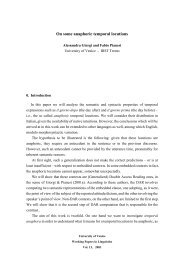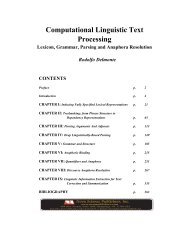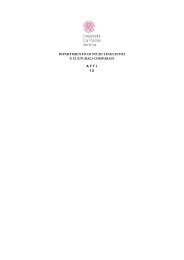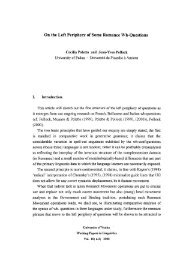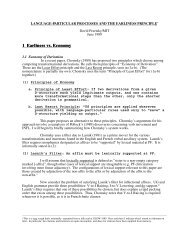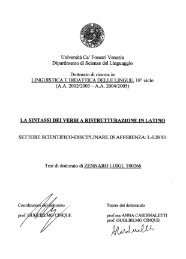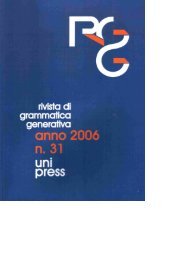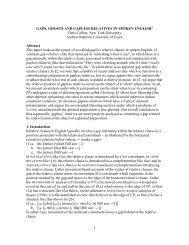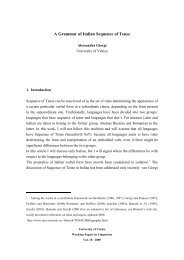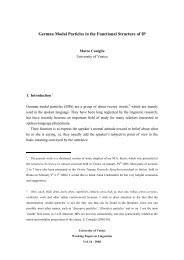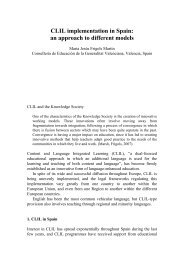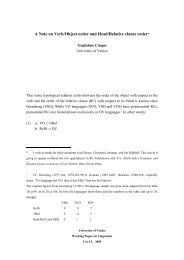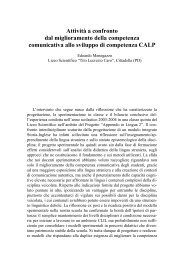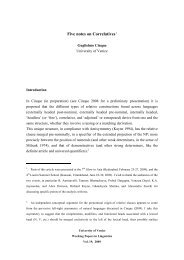Chinese relative clauses: restrictive, descriptive or appositive? - Lear
Chinese relative clauses: restrictive, descriptive or appositive? - Lear
Chinese relative clauses: restrictive, descriptive or appositive? - Lear
You also want an ePaper? Increase the reach of your titles
YUMPU automatically turns print PDFs into web optimized ePapers that Google loves.
FRANCESCA DEL GOBBO<br />
(5) a. The boys, who have frankly lost their case, should give up.<br />
b.* The boys that have frankly lost their case should give up.<br />
In <strong>Chinese</strong>, the insertion of a sentential adverb of modification yields<br />
ungrammaticality, in both cases of possible <strong>or</strong>ders:<br />
(6) a.* Na-xie [RC shunbianshuo kaoshi shibai de] nanhai<br />
those incidentally exam fail DE boys<br />
zhuandao lingwai yi-suo daxue qu-le.<br />
transfer other one-CL university go-LE<br />
b.* [RC Shunbianshuo kaoshi shibai de] na-xie nanhai<br />
incidentally exam fail DE those boys<br />
zhuandao lingwai yi-suo daxue qu-le.<br />
transfer other one-CL university go-LE<br />
* ‘The boys that incidentally failed the exam transferred to another<br />
university.’<br />
Ross (1967) maintains that quantified noun phrases cannot usually serve as<br />
antecedents of an <strong>appositive</strong> <strong>relative</strong> clause:<br />
(7) a. Every student that wears socks is a swinger.<br />
b.* Every student, who wears socks, is a swinger.<br />
In <strong>Chinese</strong> no difference arises if the quantifier precedes <strong>or</strong> follows the<br />
<strong>relative</strong> clause, as pointed out also by Lin (1997):<br />
(8) a. Mei-ge [RC chuan wazi de] xuesheng dou shi tiaowude.<br />
every-CL wear socks DE student all be dancers<br />
b. [RC Chuan wazi de] mei-ge xuesheng dou shi tiaowude.<br />
wear socks DE every-CL student all are dancers<br />
‘Every student that wears socks is a dancer.’<br />
Chierchia and McConnell-Ginet (1990) argue convincingly that <strong>appositive</strong>s<br />
are not presuppositions, but backgrounded assertions. M<strong>or</strong>e precisely, they<br />
maintain that the content of an <strong>appositive</strong> <strong>relative</strong> clause is a backgrounded<br />
component of what is being asserted, not of what is being presupposed. They<br />
show this by reasoning that the truth of an <strong>appositive</strong> <strong>relative</strong> clause is not<br />
taken f<strong>or</strong> granted. In the case of a presupposition, instead, its assumed truth<br />
is a precondition f<strong>or</strong> the felicitous utterance of the sentence and places a kind<br />
of constraint on discourse contexts that admit the sentence f<strong>or</strong> interpretation.<br />
290



